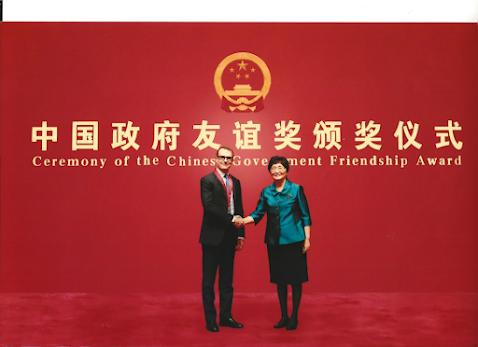Linda Wong Calls for Food Conservation on World Food Day 2024
October 16 2024 marks the 44th World Food Day, with the theme “Food for Security, Better Life Together, and a Brighter Future,” calling on people worldwide to prioritize food security. CBCGDF-Media interviewed Professor Linda Wong, Editor-in-Chief of CBCGDF-OceanWetlands, and Deputy Secretary-General of the China Biodiversity Conservation and Green Development Foundation (CBCGDF), who shared her insights on this important issue.
On the occasion of the 44th World Food Day, Linda Wong emphasizes the critical importance of food conservation in addressing global food security. This year’s theme, “Food for Security, Better Life Together, and a Brighter Future,” serves as a powerful reminder for people around the world to prioritize food safety and sustainability.
Today, our food is so easily accessible that we often forget the costs associated with its production process. Wong highlights the connection between food and water resources, stating, “Conserving food is synonymous with conserving water.” Water is an essential component of food production, and reducing food waste directly contributes to more efficient water usage. By minimizing food waste, we can help alleviate the strain on water resources, ensuring that we have enough for both agricultural needs and human consumption.
Furthermore, Linda points out the relationship between food and ecosystems. She explains, “Saving food means reducing the destruction of habitats.” Food production often leads to habitat degradation and loss of biodiversity. By prioritizing food conservation, we can help protect the ecosystems that sustain both wildlife and human life, creating a more balanced environment.
The abundance of food varieties is closely linked to biodiversity. Globally, we are witnessing a rapid loss of genetic resources in food and crops. Biodiversity provides us with a wealth of plant resources that have been developed over time into diverse agricultural crops. As an observer to the International Treaty on Plant Genetic Resources for Food and Agriculture (ITPGRFA), Wong calls for increased and effective protection mesaures of traditional crop genetic resources to safeguard food security for the public.
Linda Wong also urges awareness promotion about the excessive material consumption and waste driven by industrial civilization. “We must be vigilant against the culture of waste that comes with our modern lifestyles,” she warns. By re-evaluating our consumption patterns and adopting more sustainable practices, we can make a significant impact on food security and environmental health. Every year, we witness numerous shopping festivals that encourage consumers to stockpile unnecessary goods. As these items approach their expiration dates, they often lead to significant waste. We urge everyone to engage in self-reflection and develop a more rational understanding of consumption during these events, promoting moderation and mindful purchasing habits.
In addition, she calls for a greater focus on the biodiversity footprint of our food systems. She urges the international community to establish a “Biodiversity Footprint Index,” similar to carbon trading systems in place today. “Just as carbon can be measured and offset, we need to create a way to quantify and mitigate our impact on biodiversity,” she states. This Index would help guide policymakers and consumers towards more sustainable food choices that preserve biodiversity.
Moreover, the rise of fast delivery services has become a concerning trend. In China, for example, a report by Sullivan indicates that the order volume in the delivery industry reached approximately 40.88 billion in 2023, a 22.8% increase year-on-year, with Meituan hitting a peak of 78 million orders in a single day. While this surge in orders creates significant employment opportunities and saves time, it also comes at a cost: a loss of appreciation for homemade meals and an increase in single-use plastic waste and food waste. Wong emphasizes that as we pursue convenience, our awareness of its environmental impact is insufficient, and she hopes for improvements in this area. She advocates for a culture that encourages “slow food,” urging people to savor their meals and enjoy the process of cooking rather than simply filling their stomachs.
As World Food Day approaches, it reminds us how the importance of food. Her call to action serves as a reminder that everyone has a role to play in achieving food security and protecting the planet. by conserving food, we not only protect our water resources and ecosystems but also pave the way for a more sustainable and equitable future.
(Please note: This article is a routine work record. It is based on interview minutes and is for information only.)
Reporter: Samantha
Editor: Wendy
Contact: v10@cbcgdf.org; +8617319454776
Contribution
Do you know? We rely on crowd-funding and donations. You have the opportunity to help an international movement to advance biodiversity conservation. Donate TODAY to power up the movement to make it a better world for all life.
Donation(501C3)Paypal: intl@wbag.org
https://www.paypal.com/donate/?hosted_button_id=2EYYJJZ8CGPLE







Comments
Post a Comment